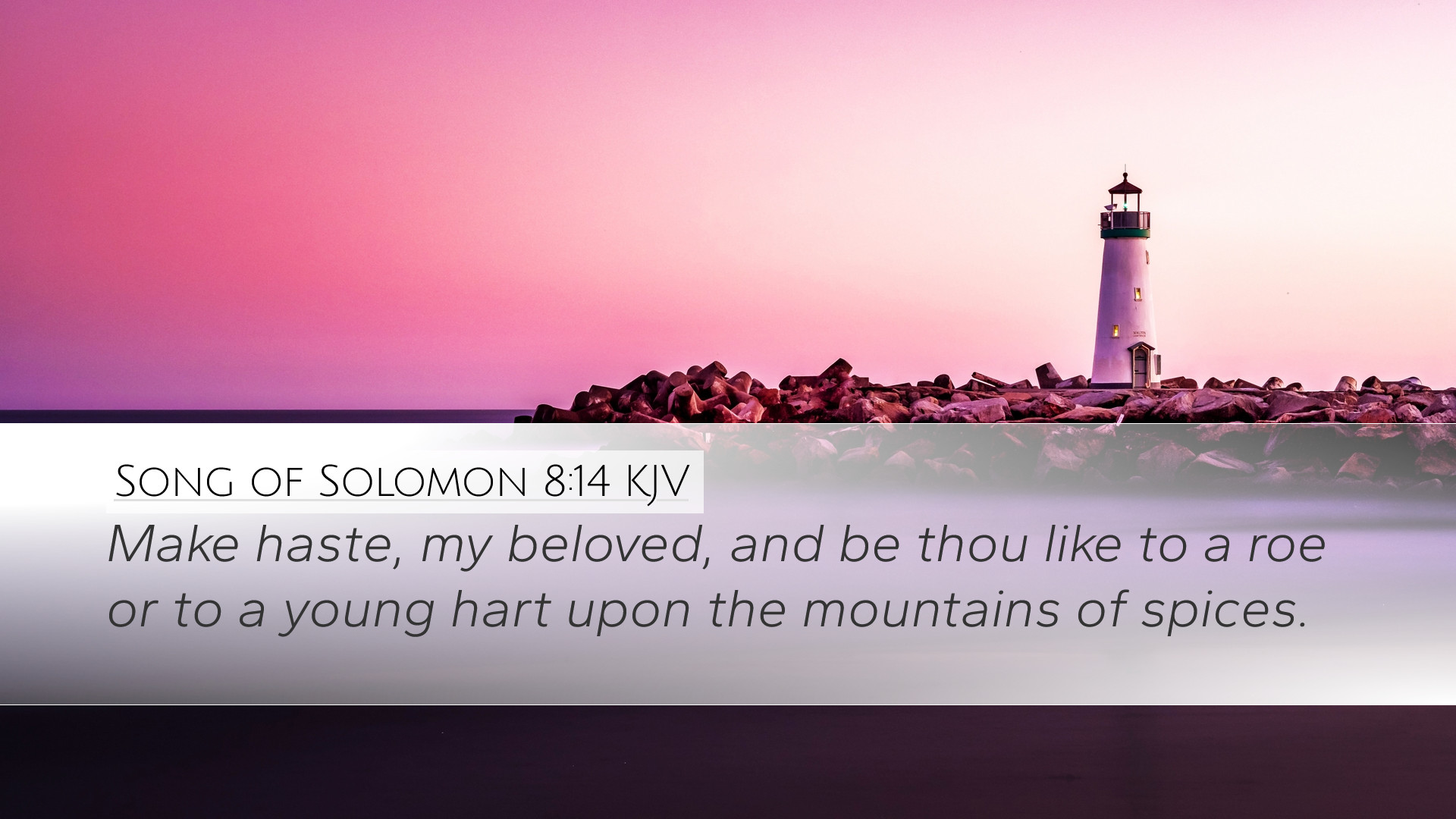Old Testament
Genesis Exodus Leviticus Numbers Deuteronomy Joshua Judges Ruth 1 Samuel 2 Samuel 1 Kings 2 Kings 1 Chronicles 2 Chronicles Ezra Nehemiah Esther Job Psalms Proverbs Ecclesiastes Song of Solomon Isaiah Jeremiah Lamentations Ezekiel Daniel Hosea Joel Amos Obadiah Jonah Micah Nahum Habakkuk Zephaniah Haggai Zechariah MalachiSong of Solomon 8:14
Song of Solomon 8:14 KJV
Make haste, my beloved, and be thou like to a roe or to a young hart upon the mountains of spices.
Song of Solomon 8:14 Bible Commentary
Commentary on Song of Solomon 8:14
Verse: “Make haste, my beloved, and be thou like to a roe or to a young hart upon the mountains of spices.” (Song of Solomon 8:14, KJV)
Introduction
The Song of Solomon, also known as the Song of Songs, is a poetic dialogue that explores themes of love, desire, and intimacy. Chapter 8 serves as a climactic conclusion to the book, encapsulating the passionate and longing sentiments of the bride for her beloved. Verse 14 illustrates this yearning vividly, urging the beloved to come swiftly.
Exegesis of the Verse
This verse can be perceived as an intimate call from the bride to her beloved, expressed through vivid imagery. The request for the beloved to “make haste” indicates a strong desire for communion. The comparison to a “roe” or “young hart” implies swiftness, grace, and eagerness, enhancing the urgency and yearning within her longing.
Imagery and Symbolism
1. The Roe and the Young Hart:
- The roe and the young hart symbolize beauty and agility. This metaphor reflects the bride's ideal vision of love, characterized by vitality and movement.
- In the biblical context, these animals are often associated with swiftness and desirability, further emphasizing her longing for immediate presence.
2. The Mountains of Spices:
- The reference to “mountains of spices” suggests a place of richness and fragrance, representing the joy and sweetness of love.
- Mountains often imply elevation and obstacles, possibly indicating the challenges in love that must be overcome for the sweet union to take place.
Commentary Insights
Matthew Henry's Perspective
Matthew Henry interprets this verse as a powerful expression of affection and a clear illustration of the intense desire that true love entails. He emphasizes that the bride's urgency reveals a profound longing for union with her beloved, symbolic of the soul's yearning for communion with God.
Albert Barnes' Interpretation
Albert Barnes observes that the plea in this verse captures the unrestrained passion that can characterize human relationships, illustrating the beauty of love in its most fervent form. He draws a parallel between the bride's desire for her beloved and the Church's longing for Christ, emphasizing that both experiences of love demand haste and immediacy.
Adam Clarke's Commentary
Adam Clarke offers a detailed exploration of the verse's figurative language. He notes that the call to “make haste” reflects an impatience that can resonate with fervent love. Clarke also highlights that the “mountains of spices” can symbolize both the trials inherent in pursuing love and the transcendent joy found when love triumphs.
Theological Reflections
The theological implications of this verse extend beyond the romantic. The expressions of love, urgency, and beauty in this song invite deeper considerations of the relationship between Christ and the Church. The longing for the beloved can be seen as emblematic of humanity's longing for divine connection and fulfillment.
Spiritual Application
For pastors and theologians, Song of Solomon 8:14 serves as a reminder of the sacredness of love—both human and divine. It encourages reflection on how yearning for God should reflect the same urgency as the bride's longing for her beloved.
- This verse prompts believers to consider their own spiritual lives and the ways they may be called to deepen their relationship with God.
- The imagery encourages meditation on love's beauty and complexity, prompting personal and community reflection on how to engage in loving relationships that mirror divine love.
Conclusion
In conclusion, Song of Solomon 8:14 encapsulates the essence of deep, affectionate love through rich imagery and insightful metaphors. Drawing from the insights of significant biblical commentators, it highlights the urgency, beauty, and complexity of romantic and divine love. This verse serves as an invitation for all to deepen their understanding and experience of love as a powerful and sacred force in the human experience.


